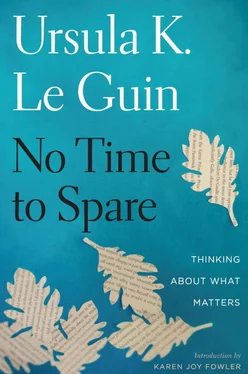So what is our new metaphor to be? It might be the difference between life and death to find the right one.
October 2012
I’M FASCINATED BY this historical snippet from the New York Times ’s “On This Day” feature:
On October 5, 1947, in the first televised White House address, President Truman asked Americans to refrain from eating meat on Tuesdays and poultry on Thursdays to help stockpile grain for starving people in Europe.
The first televised White House address—that’s interesting. Imagine a world in which a president speaks to the people on the radio, or can speak only to a physically present audience, like Lincoln at Gettysburg. How quaint, how primitive, how different from us, were those simple folk of olden days!
But that’s not what fascinates me in this item. What I’m working hard to imagine or remember is a country whose president asked his people not to eat beef on Tuesdays or chicken on Thursdays because there were people starving in Europe. The Second World War had left the European economy as well as its cities pretty much in ruins, and this president thought Americans would a) see the connection between meat and grain, and b) be willing to forgo a luxury element of their diet in order to give away a more essential food to hungry foreigners on another continent, some of whom we’d been killing, and some of whom had been killing us, two years earlier.
At the time, the request was laughed or sneered at by some and ignored by most. But still: can you imagine any president, now, asking the American people to deprive themselves of meat once or twice a week in order to stockpile grain to ship to hungry foreigners on another continent, some of them no doubt terrorists?
Or asking us to refrain from meat now and then to provide more grain to programs and food banks for the 20,000,000 Americans living in “extreme poverty” (which means malnutrition and hunger) right now?
Or, actually, asking us to do without anything for any reason?
Something has changed.
Since our betrayed public schools can no longer teach much history or reading, people may find everyone and everything before about twenty-five years ago unimaginably remote and incomprehensibly different from themselves. They defend their discomfort by dismissing people before their time as simple, quaint, naive, etc. I know Americans sixty-five years ago were nothing of the sort. Still, that speech of Harry Truman’s tells me something has indeed changed.
Being very old, I remember a little about the Depression, and a lot about the Second World War and its aftermath, and some things about Lyndon Johnson’s “war on poverty,” and so on. This experience doesn’t allow me to ever take prosperity for all as a fact—only an ideal. But the success of the New Deal and the socioeconomic network set in place after 1945 allowed a lot of people to assume almost unthinkingly that the American Dream had come to pass and would go on forever. Only now is a whole generation maturing that didn’t grow up in the alluring stability of steady inflation, but has seen growth capitalism return to its origins, providing security for none but the strongest profiteers. In this respect, the experience of my grandchildren is and will be very different from that of their parents, or mine. I wish I could live to see what they’re going to do about it.
But this still doesn’t quite take me to whatever it is about that request of old Harry’s that intrigues me so, and that, when I think about it, makes me feel as if the America I’m living in is somebody else’s country.
An education that gave me a sense of the continuity of human life and thought keeps me from dividing time into Now (Us—the last few years) and Then (Them—history). A glimmer of the anthropological outlook keeps me from believing that life was ever simple for anybody, anywhere, at any time. All old people are nostalgic for certain things they knew that are gone, but I live in the past very little. So why am I feeling like an exile?
I have watched my country accept, mostly quite complacently, along with a lower living standard for more and more people, a lower moral standard. A moral standard based on advertising. That hard-minded man Saul Bellow wrote that democracy is propaganda. It gets harder to deny that when, for instance, during a campaign, not only aspirants to the presidency but the president himself hides or misrepresents known facts, lies deliberately and repeatedly. And only the opposition objects.
Sure, politicians always lied, but Adolf Hitler was the first one who made it into a policy. American politicians didn’t use to lie as if they knew that nobody cared whether they lied or not, though Nixon and Reagan began testing those waters of moral indifference. Now we’re deep in them. What was appalling to me about Obama’s false figures and false promises in the first debate was that they were unnecessary. If he’d told the truth, he would have supported his candidacy better, as well as putting Romney’s faked figures and evasive vagueness to shame. He would have given us a moral choice instead of a fudge-throwing match.
Can America go on living on spin and illusion, hot air and hogwash, and still be my country? I don’t know.
I guess it’s become improbable even to me that a president should ever have asked Americans not to eat chicken on Thursdays. Maybe it is quaint, after all. “My fellow Americans, ask not what your country can do for you—ask what you can do for your country.” Yeah, uh-huh. Oh boy! That one did some fancy lying too. Still, he talked to us as adults, citizens capable of asking difficult questions and deciding what to do about them—not as mere consumers capable of hearing only what we want to hear, incapable of judgment, indifferent to fact.
What if some president asked those of us who can afford to eat chicken not to eat chicken on Thursdays so the government could distribute more food to those 20,000,000 hungry members of our community? Come off it. Goody-goody stuff. Anyhow, no president could get that past the corporations of which Congress is an almost wholly owned subsidiary.
What if some president asked us (one did, once) to accept a 55 mph speed limit in order to save fuel, roads, and lives? Chorus of derisive laughter.
When did it become impossible for our government to ask its citizens to refrain from short-term gratification in order to serve a greater good? Was it around the time we first began hearing about how no red-blooded freedom-loving American should have to pay taxes?
I was certainly never in love with the mere idea of “doing without,” as Puritans are. But I admit I’m depressed by the idea that we can’t even be asked to consider doing without in order to give or leave enough for people who need it or will need it, including, possibly, ourselves. Is the red-blooded freedom-loving American so infantile that he has to be promised whatever he wants right now this moment? Or, to put it less fancifully, if citizens can’t be asked to refrain from steak on Tuesdays, how can industries and corporations be asked to refrain from the vast and immediate profits they make from destabilizing the climate and destroying the environment?
It appears that we’ve given up on the long-range view. That we’ve decided not to think about consequences—about cause and effect. Maybe that’s why I feel that I live in exile. I used to live in a country that had a future.
If and when we finish degrading the environment till we run out of meat and the rest of the luxury foods, we’ll learn to do without them. People do. The president won’t even need to ask. But if and when we run out of things that are not a luxury, like water, will we be able to use less, to do without, to ration, to share?
Читать дальше












